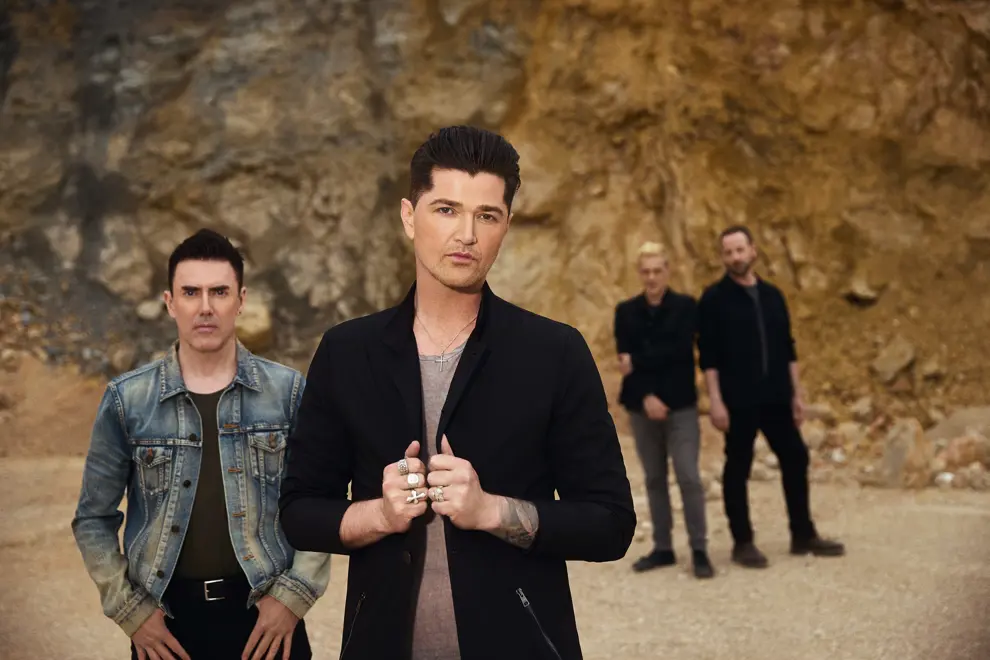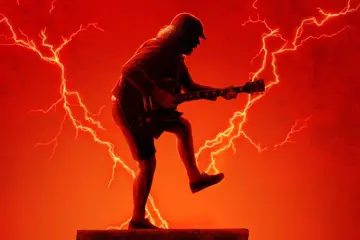 The Script
The ScriptThe Script are known and loved for the emotionally charged.
The Irish pop-rock band are instantly recognised thanks to their wrecking ball, supercharged tunes like Breakeven, The Man Who Can’t Be Moved, For The First Time, and stacks more.
They’re the band that soundtracks weddings, gets played at karaoke and birthday parties, and helps people through their roughest times. In January and February 2025, the band will return to Australia with those classic tunes and a new album.
Last month, the band released their seventh album, Satellites, an album that simultaneously feels like classic The Script while embedding some new twists.
Across the album’s 12 tracks, the band explore pop music (Unsaid), joyous jigs (Run Run Run), grief (Gone, Home Is Where The Hurt Is), hidden anxiety and depression (Inside Out), and an emotive folk-flavoured ballad (the title track) co-written by lead guitarist Mark Sheehan, who passed away last April.
With Satellites, The Script acknowledge that they’ll never be the same without Sheehan, who co-founded the band in 2001 and honour his legacy by continuing, bringing joy to listeners through their music. And, in the album cover and press images, fans see the silhouettes of four band members, including a faded but ever-present image of Sheehan.
Singer Danny O’Donoghue said of the band’s continuation and the release of Satellites upon its arrival last month, “We're just trying to get on and do what it is that we all feel is the next right thing to do, and that’s to keep making more great music.”
The Music caught up with O’Donoghue as they announced their Australian tour and quizzed the singer on what keeps him and The Script fresh and where they pull inspiration from over two decades into their career with already career-defining tracks.
“People!” O’Donoghue replies enthusiastically, “You can hear the most profound stuff coming out of a kid's mouth because they don't know how to put sentences together, so they put these four words together that you've never heard of, and it’s like, ‘Oh, my God, it's genius.’ Or somebody older.”
O’Donoghue trails off to an anecdote where he was in a taxi, stating that most taxi drivers in England are “nationalist, slightly racist, horrible people.” They arrived at the train station O’Donoghue needed to be at, and he offered the driver a £50 note. The driver wouldn’t take it as he couldn’t break it.
“He's like, ‘Oh, mate, come on. I'm short on change.’ And in my mind, I was like, ‘Yeah, you are short on change. You're never gonna change. You're always gonna stay the same: this fucking pissed off guy in a car blaming everybody else for your own problems,’” O’Donoghue recalls.
“That's just an example of where I hear people saying stuff, and they say profound shit all the time. I could write this story! I haven't written it yet, but I could write this story about a cab driver who's short on change, you know what I mean?” O’Donoghue explains. “I’m just trying to take those bad things about people [and] maybe turn them into a lesson as well, you know? There are lessons to be found everywhere. I love doing that.”
It's an observational style of songwriting that we don’t hear about all that often, but O’Donoghue admits that it’s “definitely” become his go-to way to write a song.
Challenging the things he hears people say – good or bad – O’Donoghue aims to try to make a song poignant and relatable – even when he’s in the spotlight.
Not too long ago, his girlfriend called him out for being petty. “And I was like, ‘Me?!’ I was hurt over it, and I was like, ‘Well, that was an opportunity for me to hear a truth about myself,’” O’Donoghue shares.
And he really can be petty. “Sometimes, I can be really fucking petty over stuff – I won't let the smallest thing go. Like, if I held the door open for somebody and they walked through and they didn't say thank you, I'm petty over it [and] expecting a thank you.” After being shown the reality of being petty, O’Donoghue says he was able to “own it.”
He explains, “I was like, ‘You know what, I'm totally petty.’ And it was a beautiful moment that ended up more magic because that hurt me during the day, and now I put music to it, and because I'm saying it, it actually releases me from being petty because I know I'm petty.”
O’Donoghue found lyrical inspiration from someone else who was close to him, a friend of his who casually remarked, “The thing that never changes is things are going to change.” To O’Donoghue, a lightbulb went off in his brain, with the singer calling the saying “fucking genius.”
“I was like, ‘Fuck, that's nearly as good as a Bob Dylan lyric,’” O’Donoghue says. “I knew it in an instant when he said it because I was like, ‘Wow, that impacted me.’ I try to look for those things day to day, actively searching, because what are songs? They're ideas. They are the things that people say. So, listen to people because they'll give you some gold.”
O’Donoghue also listened to himself and drew from some personal life-changing experiences while making Satellites.
On At Your Feet, the singer finds inspiration in political pundits. On Inside Out, he mentions social media habits feeding into ADHD and OCD, diagnoses he received at the age of 43.
The diagnosis of ADHD is on the rise, especially in adults – according to the ADHD Foundation Australia, more than a million people have ADHD. ADHD Australia adds that the disorder affects approximately one in 20 Australians.
Addressing the latter song, O’Donoghue admits, “That's real life. Honestly, I was diagnosed with all of those.
“I was diagnosed with ADHD and OCD [at the] fucking age I am now, and I'm dyslexic, you know? I have all of these traits that are tough, [but] even if you don't have any of those traits, Instagram and social media will give you those traits. If you're not obsessively compulsive about something, they just wipe your memory every few seconds with another different thing.”
O’Donoghue says that apps like Instagram offer an experience that’s “exactly what ADHD feels like because you can't concentrate on anything. Got another thought coming into your mind every fucking five seconds that just wipes the other one out, and all of it takes priority.”
Offering an example of his day-to-day life, he adds: “It's like, I need to do my washing. I'm on an interview soon. I haven't sung the song. I’m having constant adrenaline hits all the time. And if you find yourself doom scrolling on top of ADHD, it's like my mind is changing every two seconds, and every three, it sends me into a really bad spiral.
“The OCD thing helps me when I'm sitting down to play. If I put good things in front of me, then it's great. So, if I put fruit, working out, and music in front of me, and I get obsessively compulsive about those things, my life is brilliant.
“But if I put down alcohol, late nights, binge scrolling or binge watching anything on TV, it's a nightmare because I'll do all of them brilliantly, maniacally, as fast as I can, as hard as I can,” the singer admits with a laugh.
Routine is massively important for O’Donoghue. Pulling himself out of the spirals he doesn’t want to be in involves being honest with himself, recognising where he’s at, and utilising self-help resources.
In January, he realised he couldn’t be on his phone anymore and endeavoured to find a “dumb phone” [“They’re very hard to find!”] – one with Snake on it.
“I was on that for a while. And then, because I'm in the band, I gotta have things that have social media to check it and to upload [posts] to be in contact with your fans, particularly around release time,” he says. “So, I had my phone, and then I started to realise when I started to change my mind to, ‘Oh, I'm going to use all these self-help things,’ I'm sitting there scrolling on self-help stuff.
“The algorithm knows – ‘he likes self-help stuff; give him that stuff because that'll keep him on here.’ I’m just like, ‘Oh, no, it's all good for me! It's self-help stuff! I'm only just now separating from that and being like, ‘For fuck’s sake, I'm back in again.’ If you try to get out, the only way out is back in.”
Despite the pains of his recent diagnoses, O’Donoghue has found a positive: maybe he can help other adults who don’t even know they have ADHD.
“You see it so quickly in people who do have ADHD and OCD. Maybe [social media] it's giving people a certain level of it,” O’Donoghue ponders.
“But it's so apparent – I know two or three people where I'm just like, ‘You 100% have ADHD and OCD’. I can see it. I can see you online all the time. I can see it in your doom scrolling. They’ll order a pizza, and next, they're on Instagram again, scrolling. You need to go get checked because I think you got some of the same shit I have.”
In January and February 2025, The Script will return to Australia to perform Satellites tracks and hits, playing to massive crowds in arenas and for a day on the green.
The last time the band played in Australia, it was a Greatest Hits run – “Everybody's going to come along, and they're going to know the songs,” O’Donoghue says of that experience, excited by the prospect of adding maybe four songs from a new album onto the set.
“We’ve never been an obscure band,” the singer insists, adding that you’ll never have to ask, “What are they playing? Is that a B-side?” at a The Script show.
“We love giving great shows where everybody knows all the songs. For the most part, every The Script show is a ‘Best Of’ because we try to make it as good a show as possible, with as many singalong moments as you can – all of those things come from your singles.”
What O’Donoghue loves about the band’s latest album is the balance of mid-tempo tracks and bangers, knowing they have a new opportunity to break up the set at the forthcoming shows. Really, though, he’s thrilled about the group’s upcoming return to Australia, recalling memories of “getting kicked out of nightclubs” with a laugh.
“I just love the people. I love how relaxed life is there compared to most other countries,” O’Donoghue states, sharing a love for the Australian sense of humour, not taking ourselves too seriously, and not being afraid to make fun of each other. “It's quite an Irish way to be! I don't know if it's Australian or just a cool way to be in life, but you guys have it.”
Adding that a sense of humour provides “a nice filter” to your life “if you wanted to make it 5% or 10% better,” psychologically, O’Donoghue believes Australia is a “really positive and healthy place to be.” It’s the place to be in January and February 2025.
Satellites is out now via BMG Rights Management – you can listen to it here. You can catch The Script live in Australia on the following dates:
THE SCRIPT
SATELLITES WORLD TOUR - AUSTRALIA - JANUARY & FEBRUARY 2025
With special guests Calum Scott, Montaigne, X Ambassadors and Lotte Gallagher
Presented by Frontier Touring and Roundhouse Entertainment
Saturday 25 January - Bimbadgen | Hunter Valley, NSW*
Sunday 26 January - Sirromet Wines | Mount Cotton, QLD*
Tuesday 28 January - WIN Entertainment Centre | Wollongong, NSW
Thursday 30 January - ICC Sydney Theatre | Sydney, NSW
Saturday 1 February - Mt Duneed Estate | Geelong, VIC*
Sunday 2 February - Peter Lehmann Wines | Barossa Valley, SA*
Wednesday 5 February - Burswood Park | Perth, WA*
ALL SHOWS LICENSED ALL AGES*
*U18s must be accompanied by a parent/legal guardian
This event is recommended for patrons aged 16+
Tickets: Frontier Touring, a day on the green






